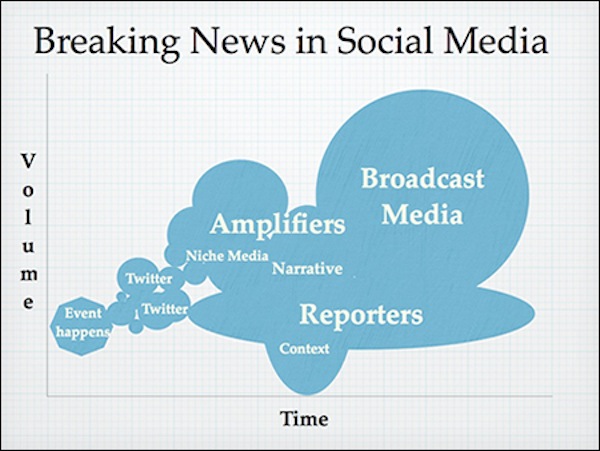Editor’s note: Hong Qu is a user experience designer who was part of the startup team that built YouTube. He is currently a visiting fellow at the Nieman Foundation, working on an application to help journalists and other users better follow stories though Twitter.
In a breaking news situation, journalists get an adrenaline rush. There is a palpable eagerness to get the scoop, to be the first to bring the story to the public. In today’s world of social media, mobile phones, and the real-time 24/7 news cycle, though, journalists face competition from all sides: eyewitness accounts, official sources, and even friends and family are sharing news before mainstream news institutions have “published” the official news story.
To illustrate this predicament, I compiled 26 tweets that “broke” the Boston Marathon bombing news.
Upon examining this timeline, we might ask: How does social media transform the role professional reporters play in these kinds of news events?
I would say that journalists have three capabilities that are vital to the news ecosystem: broadcasting, credibility, and storytelling.
As citizen journalists inadvertently gather and (attempt to) distribute news, they lack the ability to broadcast to millions of people. In theory, their posts in social media can reach anyone who has Internet access. However, in practice, few can find them among all the noise and, even when found, few will have reason to trust them.
Journalists track down these sources, vet their credibility, and, finally, assemble scattered pieces of information like a jigsaw puzzle into a meaningful story by filling in context. Others edit the story before broadcasting to a mass audience. This process definitely takes more time and resources than clicking the retweet button. Nevertheless, the public needs news organizations that have sufficient credibility to vouch for the accuracy of the eyewitness, the amplifiers, and the information itself. In the long run, news organizations to which the public turns for good judgment in adjudicating news will accrue goodwill and command attention.
The pace of the news cycle is quickening, but the fundamental responsibility of a journalist to gather and disseminate reliable news hasn’t changed, nor will it be supplanted by savvy social media auteurs. The only way for any person to become a good reporter — regardless of whether she has a degree or works for a news organization — is to consistently produce news stories in a way that is useful and engaging to consumers of news.

A conceptual representation of symbiotic interplay between social media and mainstream news that produces a more participatory, accurate and compelling news cycle. Image by Hong Qu.
There is a reflexive reaction to pit emergent social media behavior against the traditional journalistic practices and norms. This defensive posture is counterproductive for both sides. Rather than pointing out flaws in order to uphold one model over the other, we should appreciate the interplay between them with a sense of symbiotic dependence that ultimately produces a more participatory, accurate and compelling news cycle.
Social media is not going away. Even though the mainstream news industry might be experiencing creative destruction, demand for good storytelling from trustworthy news sources that enrich the public discourse isn’t going away either.